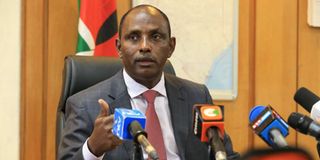Premium
Broke Kenya seeks Sh75bn debt suspension

National Treasury Cabinet Secretary Ukur Yatani addresses the media when he was presenting Survey on socio-economic impact of Covid-19 on households at his offices at the Treasury Building on July 9, 2020.
What you need to know:
- Kenya’s public debt touched Sh7.12 trillion in September, a Sh1.157 trillion rise since September last year.
- Nearly three quarters (72 percent) of this new debt, or Sh835 billion, has been borrowed in the Covid-19 period.
The government is broke, and in need of a Sh75.5 billion ($690 million) debt relief.
Treasury Cabinet Secretary Ukur Yatani yesterday said the government is now ready to take up an offer to defer repayment of a portion of its debts, despite putting the country’s credit rating at risk of a downgrade.
A credit rating downgrade is likely to weaken the shilling and raise the cost of borrowing, hitting consumers and businesses hard.
The Cabinet will next week make a final decision on whether to take up a Covid-19 debt relief offer by the group of 20 (G20) most industrialised nations, in a sharp departure from the policy position that the Treasury had taken earlier this year.
“We have been reluctant in the past because of the attendant unintended consequences in terms of those holding private debt,” Mr Yatani said in an interview with the Reuters news agency. “But now after getting a bit of assurance that it is a matter that can be managed, we are now strongly considering joining the arrangement.”
Kenya’s public debt touched Sh7.12 trillion in September, a Sh1.157 trillion rise since September last year.
Nearly three quarters (72 percent) of this new debt, or Sh835 billion, has been borrowed in the Covid-19 period.
Debt default
Acceptance of the repayment relief plan could be interpreted as a technical sovereign debt default by holders of Kenya’s Eurobonds, which Mr Yatani had in May this year cited as the reason for snubbing the G20 offer.
Clause 10 of the Eurobond prospectus states that holders of 25 per cent of the debt papers can call up the entire loans and interest in the event of a default.
Some of the occurrences considered as default include non-payment of any external debt worth more than $25 million (Sh2.6 billion) or a moratorium on any external debt.
Failure to pay principal for 15 days or interest for 30 days and failure to comply with terms in the contracts for 45 days is also considered a technical default.
Mr Yatani said Nairobi has received “some clarity” on what impact the debt relief programme might have on the country’s credit rating, and is keen to ease debt repayment pressures at a time tax revenue collections are heavily weighed down by Covid-19 economic disruptions.
Debt relief
The Treasury CS said that agreeing to the debt relief plan will also help Kenya secure future funding from the International Monetary Fund and the World Bank; which the government has been eyeing to plug its huge budget deficit.
“They are trying to introduce this as one of the key pre-requisites to accessing resources from the IMF and World Bank,” Mr Yatani told Reuters.
The change of heart now turns focus on how the country will navigate through some of the key concerns it had raised earlier when snubbing the offer.
Kenya had only six months ago said the terms of the deal were too restrictive and it also fretted the impact that debt relief could have on the country’s credit rating.
There were concerns that the terms of G20’s Debt Service Suspension Initiative (DSSI) limited beneficiary countries’ access to international capital markets during the standstill, which could hinder Kenya’s ability to finance its budget deficit later in the year.
The Treasury had instead opted to engage creditors including Germany, Sweden, Japan, China and France individually to secure debt service moratoriums of about one year.
The debt relief has come with consequences for countries which opted for it, with ratings agency Moody’s putting Ethiopia, Pakistan, Cameroon, Senegal and the Ivory Coast on review for downgrades, saying a G20-backed debt suspension scheme poses risks to private creditors.
Moody’s already put Kenya on B2 a negative outlook citing huge external debt, lower revenues and currency risks.
CS Yatani had said the Eurobond prospectus provides that non-payment of any other dollar debt, including moratoriums, are considered as an event of default that results to investors immediately calling up their funds.
The sharp increase in the number of Covid-19 infections and deaths in recent days has raised concerns on when the country would turn the corner on a health crisis that has morphed into a deep financial crunch.
Fatalities increased
Kenya had 72,686 confirmed cases of the Covid-19 on Wednesday from 44,881 on October 18, reflecting a 62 percent jump in 30 days. Fatalities have increased to 1,313 from 832 a month ago, representing a 57.8 percent rise.
Local health officials have been warning of the possibility of ushering in stringent control measures such as lockdowns akin to what is happening in Europe.
Kenya’s debt repayment costs are eating into a significant chunk of tax revenues, which are under pressure due to falling corporate profits, layoffs and job cuts.
The G20 in April agreed to suspend debt repayment obligations by least developed countries through the end of the year under pressure from global organisations. Kenya is facing a huge budget deficit, with the virus having muted tax revenue collections growth due to a slowed pace of economic activities.
Kenya’s budget deficit swelled to 8.2 percent of GDP in the financial year ended June, from an initial forecast of below seven percent due to reduced tax collection and foregone revenue on tax cuts extended to individuals and businesses from April.





